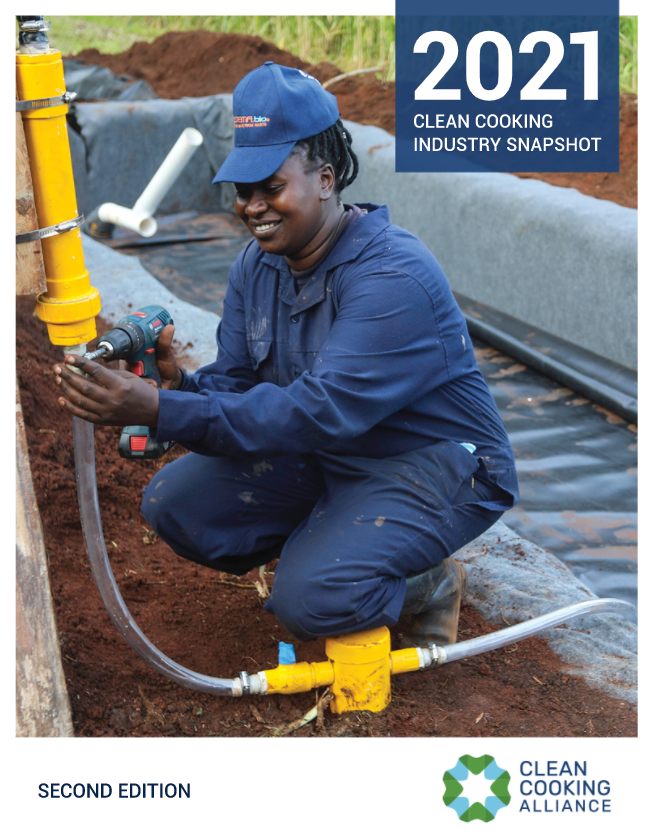Capital Raised by Clean Cooking Companies Reaches New High, according to CCA’s new “Industry Snapshot”
Clean cooking companies raised more capital in 2019 than in any year since the Clean Cooking Alliance (CCA) began tracking investment in the industry. According to CCA’s 2021 Industry Snapshot report (“Snapshot”), clean cooking companies tracked by CCA raised USD $70 million, a 63% increase compared to 2018. However, despite the surge in private sector investment, total investment remains far short of what is required to achieve universal access to clean cooking solutions by 2030.
“The world remains far off track to meet SDG 7—ensure access to affordable, reliable, sustainable, and modern energy for all,” said Wanjira Mathai, Vice President and Regional Director for Africa at the World Resources Institute, and a member of CCA’s Leadership Council. “Approximately one-third of the world’s population—2.8 billion people—still lack access to clean cooking solutions, costing trillions of dollars a year in damage to health, the climate, and local economies. The COVID-19 pandemic threatens to reverse progress and further exacerbate inequalities.”
“Closing the wide commitment and investment gap will require a sustained, well-coordinated effort that harnesses strengths and resources from a broad range of public and private actors,” said Dymphna van der Lans, CEO of CCA. “The findings from CCA’s Industry Snapshot show the potential for a modern and sustainable clean cooking industry, but there is no time to lose.”
The Snapshot series focuses on companies that manufacture, sell, and/or distribute clean or improved cooking solutions in low- and middle-income countries. In this latest edition, analysis is based on investment, operational, and financial data from nearly 50 companies for the period 2017-2019. From this data, the Snapshot highlights emerging trends and major developments in the clean cooking sector since the previous Snapshot, which was published in 2019 and covers data from 2015-2017.
One noticeable trend in the new data is the concentration of capital raised among a relatively small group of companies. The top four companies account for 56% (USD $85.5 million) of the total capital raised in 2017-2019, compared to 36% ($83.4 million) in 2012-2017.
“Despite the many differences in the clean cooking and off-grid solar sectors, the level of capital consolidation being seen in the clean cooking sector is similar to the trend observed in the off-grid solar sector in 2017, where the four largest companies attracted two-thirds of the sector’s equity investment between 2012-2017,” said Leslie Labruto, Head of Global Energy at Acumen, an investor of patient capital in early-stage companies working on solutions to poverty.
The Snapshot also identifies the increasing importance of revenue from carbon reduction programs, with companies reporting a sharp increase from 1.2% in 2017 (USD $0.52 million) to 12% in 2019 (USD $5.2 million).
“Increased innovation in the clean cooking sector, such as the rise of Pay-as-you-go and smart metering, is paving the way for more efficient carbon credit financing. We expect this to positively impact the business models, profitability, and long-term sustainability of the companies,” said Lotta Wilkman, Portfolio Coordinator at EEP Africa, a clean energy financing facility hosted and managed by the Nordic Development Fund (NDF) with funding from Austria, Finland and NDF.
In fact, the Snapshot finds that clean cooking companies have recently invested heavily in research and development (R&D) across the board, spending USD $21.3 million – equivalent to 63% of sales revenues – in 2019 alone. This relatively high level of R&D expenditure, led by early-stage LPG and ethanol companies, reflects the need to keep exploring product variation, delivery methods, and new markets. Grants continue to be a vital source of capital for innovation in the clean cooking sector, providing the main source of capital for 52% of the companies who reported R&D expenditures in 2017-2019.
“The Industry Snapshot is expected to serve as a guide for current and prospective funders in the clean cooking sector as they make their capital allocation decisions,” said Shrikant Avi, Senior Manager on CCA’s Private Sector and Investment Team. “We hope the findings serve as a foundation for nuanced, detailed discussions on scalable technologies and business models.”
To read the full 2021 Industry Snapshot, click here.

